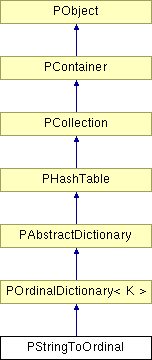
PString objects.
More...
#include <pstring.h>
Inheritance diagram for PStringToOrdinal:

Public Member Functions | |
Construction | |
| PStringToOrdinal (PINDEX count, const Initialiser *init, PBoolean caseless=false) | |
| Initialise the string dictionary of ordinals from the static array. | |
Overrides from class PObject | |
| virtual void | ReadFrom (istream &strm) |
| Input the contents of the object from the stream. | |
Classes | |
| struct | Initialiser |
| Structure for static array initialiser for class. More... | |
PString objects.
It has all the usual functions for a collection, with the object types set to POrdinalKey pointers.
In addition some addition functions are added that take a const POrdinalKey reference or a simple PINDEX instead of a pointer as most standard collection functions do. This is more convenient for when integer expressions are used as parameters to function in the collection.
See the PAbstractDicionary and POrdinalDictionary classes for more information.
| PStringToOrdinal::PStringToOrdinal | ( | PINDEX | count, | |
| const Initialiser * | init, | |||
| PBoolean | caseless = false | |||
| ) |
Initialise the string dictionary of ordinals from the static array.
| count | Count of strings in initialiser array |
| init | Array of Initialiser structures |
| caseless | New keys are to be PCaselessStrings |
| virtual void PStringToOrdinal::ReadFrom | ( | istream & | strm | ) | [virtual] |
Input the contents of the object from the stream.
This is primarily used by the standard operator>> function.
The default behaviour reads '\n' separated strings until !strm.good().
Reimplemented from PObject.
 1.4.7
1.4.7